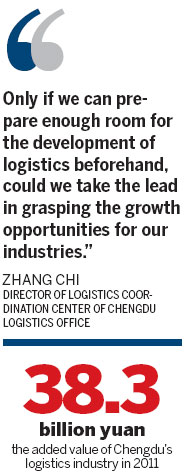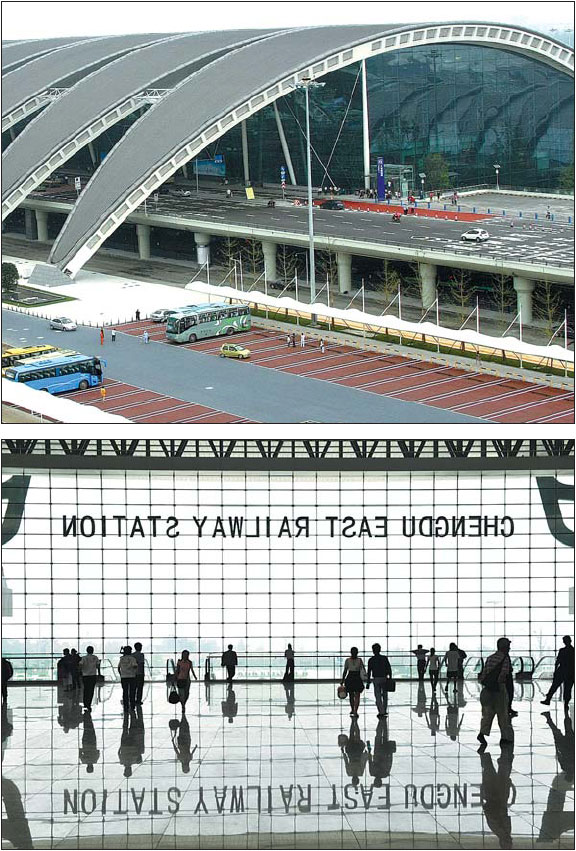Logistics provides solid industry backing
Updated: 2013-04-03 05:31
By Zheng Yangpeng in Beijing and Li Yu in Chengdu (China Daily)
|
||||||||

|
Top: Chengdu Shuangliu International Airport is one of the largest air hubs in China; above: Chengdu East Railway Station is part of improved infrastructure of the southwestern city. Provided to China Daily |
City's improved transport network guarantees foreign business success
On Jan 2, a train loaded with electronic products arrived in Lodz, a city in central Poland, after a 15 day journey from China's Chengdu. As the rail route started operating regularly in March, it has become the fastest railway freight route between China and Europe.
The regular train, traveling once a week between the two cities with a distance of more than 10,000 kilometers, cuts the transport time from 40 to 15 days, according to Chengdu Logistics Office. Previously, products made in Chengdu had to be transported to Shenzhen or Shanghai before being shipped to European ports.
The opening of the Chengdu-Lodz direct rail route is the latest effort of the inland metropolis to improve its infrastructure and establish itself as a major logistics hub in China. According to the Chengdu government's work report, the city aims to exploit its advantage in air and railway transportation to realize its goal of being a "logistics hub".
Zhang Chi, director of the logistics coordination center of the Chengdu Logistics Office, said that at present, the cost of rail freight is more than two times that of shipping, which is the main reason behind its comparatively slower growth rate. But if the efficiency of the rail freight is improved, and given it is faster than shipping, rail transportation will become increasingly popular.
"Take the Chengdu-Lodz direct rail route for example. It is vital for both destinations to have equal goods to exchange. If the train can be fully loaded in both directions, the cost will be reduced. Otherwise the cost will be very high," said Zhang.
Besides rail, the city is also developing its air transportation.
The city's air throughput was greatly boosted by the opening of a brand new terminal in July. Chengdu is now the fourth major air hub in China, with 18 direct international flight connections and 12 code-sharing global links. Key international flights connect the city with international cities including Tokyo, Amsterdam, Abu Dhabi, and Bangalore. By 2015, there will be at least 30 direct passenger and freight flights from Chengdu to major cities across the world.

"In developing Chengdu's direct flight destinations, we are targeting the major air hubs of the world. This means that we will not seek the absolute number of direct flights. By setting up interline agreements, we can reach many locations around the world," Zhang said.
Logistics industry
In 2011, added value in Chengdu's logistics industry reached 38.3 billion yuan ($6.17 billion). The logistics fee to GDP ratio, a gauge of logistics efficiency, was 16.38 percent, well below the national average of 18 percent.
Zhang said regarding transportation and logistics merely as an industry is narrow minded. Because of its significant externality, the development of the industry could leverage other industries with a value much greater than its own. In this regard, it is important to develop it as a strategic industry for the whole economy.
Chengdu's various industries can attribute their rapid growth in recent years to the improved infrastructure and logistics environment.
In 2010, when Compal Electronics Inc, one of the world's largest computer manufacturers was considering moving to Chengdu, they queried if Chengdu's logistics system could support its gigantic export demand. Zhang and his colleagues produced a pamphlet detailing the logistics cost of the city's railway, road and airport transportation, allowing Compal to make a logistics cost assessment. Compal was satisfied with the conditions and decided to move in.
The arrival of Compal brought more than 50 suppliers to Chengdu.
"During the discussion with Compal and Foxconn (in terms of settlement), I strongly felt that only if we can prepare enough room for the development of logistics beforehand, could we take the lead in grasping the growth opportunities for our industries," Zhang said.
Another example is the iPad. Two-thirds of the world's iPads come from Foxconn's Chengdu plant. All of these iPads are transported to every corner of the world through Chengdu's airport. In 2012, the city's added value in the IT industry hit 58.27 billion yuan, the largest among all industries. This would be unimaginable without the city's air handling capacity.
Looking ahead, Zhang said though the city's infrastructure and logistics can satisfy its industrial demand as a whole, there is still room for improvement in terms of efficiency. By 2015, both the quantity and quality of the city's logistics will be enhanced and lay a solid cornerstone for the city's industries.
Contact the writers at zhengyangpeng@chinadaily.com.cn and liyu@chinadaily.com.cn
(China Daily 04/03/2013 page15)

 Li Na on Time cover, makes influential 100 list
Li Na on Time cover, makes influential 100 list
 FBI releases photos of 2 Boston bombings suspects
FBI releases photos of 2 Boston bombings suspects
 World's wackiest hairstyles
World's wackiest hairstyles
 Sandstorms strike Northwest China
Sandstorms strike Northwest China
 Never-seen photos of Madonna on display
Never-seen photos of Madonna on display
 H7N9 outbreak linked to waterfowl migration
H7N9 outbreak linked to waterfowl migration
 Dozens feared dead in Texas plant blast
Dozens feared dead in Texas plant blast
 Venezuelan court rules out manual votes counting
Venezuelan court rules out manual votes counting
Most Viewed
Editor's Picks

|

|

|

|

|

|
Today's Top News
Boston bombing suspect reported cornered on boat
7.0-magnitude quake hits Sichuan
Cross-talk artist helps to spread the word
'Green' awareness levels drop in Beijing
Palace Museum spruces up
First couple on Time's list of most influential
H7N9 flu transmission studied
Trading channels 'need to broaden'
US Weekly

|

|








